Age of Mythology Showcase: Poseidon
Our showcase of the factions of Age of Mythology continue with the vengeful sea god Poseidon and his powerful retinue.
This month in our ongoing Age of Mythology showcase, we turn to the second Greek god in the game, the great Poseidon. Brother of Zeus and master of the ocean, he is a god with an expansive portfolio. Most famous for his role as god of the sea, he is also the patron of horses and earthquakes. A capricious god, he has been the antagonist in many a Greek tale. Yet, in Age of Mythology, he bestows significant powers and abilities on those who worship him.
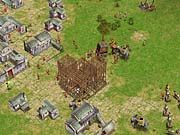
Greg Street, designer of Age of Mythology, points out, "After Zeus and possibly Athena, Poseidon shows up in Greek mythology more than any other god. He was as vengeful and lusty as his older brother, Zeus, if not more so, and involved in many tales of pursuing mortal women or punishing hapless Greek citizens for some real or imagined wrong. As god of the sea, Poseidon was relied upon by sailors for safe voyage. When he was in a good mood, he created new lands in the water and calmed the waves. But when he was in a bad mood, he would strike the ground with his trident and cause earthquakes, shipwrecks, and drownings. A typical Poseidon story involves the founding of the city soon to be known as Athens. Poseidon and Athena were both vying for control of the city. Poseidon caused a spring to bubble up from the acropolis, providing the citizens with water. Athena, however, gave the citizens the gift of the olive tree. The people chose Athena's gift, and named the city after her. Poseidon then threw a hissy fit and flooded the entire plain."
Due to his godly spheres of influence, Poseidon offers several benefits to players who choose him as their primary god. And contrary to what some might think, he's not just a master of water combat. Says Street, "Poseidon was the god of the sea, horses, and earthquakes. While he is best known as a god of the sea, giving him a huge bonus on water maps would make him pretty unpopular on land maps and make the other gods pretty unpopular on water (though Poseidon does have a few nice naval bonuses). Likewise, an earthquake really feels like a fourth age god power (which, in fact, it is). That leaves Poseidon as a strong choice for players who like cavalry."
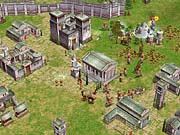
Poseidon has several significant culture bonuses. First, his cavalry units are cheaper than those of Zeus and Hades. His unique archaic (first) age mythology improvement, lord of horses, also enhances his powerful horsemanship, boosting the training speed of all cavalry. Second, he does indeed have bonuses on water maps. However, rather than getting cheaper warships or the like, he instead gets some unique units--the hippocampus and Argo--which we will explain in further detail.
Poseidon's final bonus is quite interesting. It's more like a new ability than a bonus. When his buildings are destroyed, they produce angry militia units. For each building that is destroyed by the enemy, you get one militia. Militia aren't too powerful, but they can mount a resistance against invaders and provide a sort of vengeance against those who destroy Poseidon's towns. Better yet, they don't count against your population cap and they appear free of charge.
Now, let's delve a little deeper into Poseidon's cavalry, naval units, and heroes to see just how his bonuses help his followers.
Cavalry
Cavalry are an important unit in Age of Mythology, but they are perhaps not as overpowering as in Ensemble's previous games. One reason for this is that cavalry now take up more population slots than infantry or archers, although Ensemble says you can still expect to field armies of 30 to 40 (just realize that you can have even more footmen). However, cavalry are still very strong. It is hard to classify any one culture as having the best cavalry, but the Greeks come close, despite their strength in infantry. Like their infantry, the Greeks split their cavalry into two lines, in this case the hippikons and prodromos. This does not include the scout cavalry, the kataskopos, which doesn't upgrade to further versions and thus is a single-instance unit, rather than a cavalry line. The kataskopos has its uses as a scout, and since Greek players start with one automatically, they give the beginning Poseidon player a huge scouting bonus over Egyptian and Norse players. The Egyptians start out with the pharaoh instead, who must stay home to inspire his villagers, while the Norse have it even worse--they don't get horses, and their starting military unit, the ulfsark, also has to stay put to build houses and buildings. Yet, for all its reconnaissance skill, the kataskopos won't win many fights for you. The real brawling is done by the hippikon and prodromos.
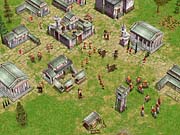
The hippikon is trainable in the second age when you can first build the stable, while the prodromos is a counter unit to cavalry that becomes available in the third age. The hippikon is your standard heavy mounted attacker, with excellent attack and armor. The prodromos, in contrast, has fewer hit points and poorer armor, but it makes up for it with great speed and a damage bonus against other cavalry. It is a better counter than the Norse ulfsark, another anticavalry unit, mainly because of its ability to chase down fleeing horses. Street reveals more about Greek cavalry: "Make no mistake--the Greeks of history were an infantry-based culture who were all about the hoplite. They thought archers were wimps who wouldn't face their enemies in battle, and the lack of the stirrup meant their cavalry couldn't perform a true charge (riders need the stirrup in order to brace a spear or lance for impact). However, Alexander the Great, among others, showed that well-disciplined elite cavalry were very useful as shock troops and for getting around the outside of all those pointy spears. Age of Mythology's hippikon is no exception. This unit is fast, it's piled with hit points and armor, and it has an attack worthy of the strongest hoplite. Their only real drawback is their great expense, which allows infantry to cost-effectively counter them, even if the hoplites can't counter the hippikon one on one."
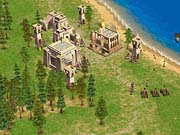
Greek cavalry can be further enhanced with improvements at the stables. Both lines of horses can be upgraded to medium, heavy, and champion level, providing ever-increasing offensive and defensive power. In addition, build times for Greek cavalry can be reduced with the levy and conscript cavalry technologies, speeding up production. When you add in Poseidon's unique first age myth tech, lord of horses, and his cheaper cav bonus, you get cavalry that fly out of the stables. For sheer quickness in pumping out stampedes of overwhelming riders, Poseidon just can't be beat. Those who loved to rush to light cavalry in the third ages of Age of Empires I and II will naturally want to play as this faction.
Ships and Heroes
Water maps won't be quite the same as they were in Age of Empires and Age of Kings. At last report, Ensemble was hoping to move away from having different ship units and instead adopt a system where you could customize ships and determine the role of vessels by the armament you placed on them. For example, putting a catapult on board a ship would turn it into a long-range siege ship, while loading the same boat with archers would turn it into a lethal warship. Adding some infantry might give it better speed.
Poseidon, as the god of the oceans, doesn't necessarily have the ability to produce better ships, but he does nevertheless have sea bonuses. Says Street, "While we didn't want Poseidon to be a no-brainer on water maps, it felt strange not to give him any bonuses on water. So Poseidon gets a couple of unique units." These two unique units are the mythlike creature hippocampus and the naval hero Argo.
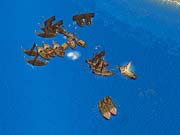
The hippocampus, while a mythological unit, isn't bought or built. Instead, it instantly appears whenever you build a docks. Docks can be constructed in the first age, so you can get this unit fairly quickly. Like the Egyptian pharaoh, the hippocampus is unique and will reappear if killed. The regeneration takes time, but it soon returns to do your bidding, and should it get killed again, you'll rediscover its services with only the inconvenience of having to wait for it to respawn. Street describes the strange beast in greater detail, "The hippocampus is a seahorse, literally, in that it has the body of a horse and the tail of a fish. Poseidon's hippocampus serves as a naval scout. He is one of the fastest units in the game, making sure that Poseidon can always find the best fishing sites, the best bonus islands, and locate the enemy navy." Also at this time, it's safe to assume that like the scout cavalry, the hippocampus has little or no attack, although it has great value in reconnaissance.
All Greek gods have their own set of unique heroes, one for each age, which are trained from your town center or fortress. And they are typically superhuman versions of ordinary units, so there is an infantry hero, an archer hero, and so forth. Poseidon, like his brothers Zeus and Hades, has one hero for each age. However, unlike them, Poseidon also possesses a fifth hero that patrols the seas for him that can be built in the mythic (fourth) age. Street elaborates, "Poseidon has a naval hero, the trireme Argo, sailed by Jason and the Argonauts of Greek mythology. The Argo, like all heroes, excels at killing myth units, in this case naval myth units."
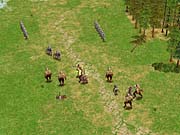
In addition to Argo, we've learned about Poseidon's other heroes. In the first age, Greeks can build an infantry hero. Poseidon's is the hero Theseus. In the second age, the archer hero can be built, and in this case, it is Theseus' wife and Queen of the Amazons, Hippolyta. "In the third age," Street says, "Poseidon gets the other female hero in the game, the warrior Atalanta. Atalanta's claim to fame was that she was the fastest hero in Greece, and her Age of Mythology unit is no exception. [The fourth age] hero is the most powerful in the game, the Cyclops Polyphemus. (Yes, there is at least one myth unit hero.) Polyphemus flattens other myth units and swats away lesser units with his iron-shod club." Like the other Greek factions, Poseidon players can only have one of each hero at a time. So by the fourth age, you can have four unique heroes. Because Greek players can only ever have one hero per age, their heroes are much more powerful than the Norse and Egyptian heroes. And if slain, they can be rebuilt (in game terms, they are being summoned back from the dead). However, thanks to Argo, Poseidon can actually command five heroes at a time.
Minor Gods and Their Powers
All gods have a starting god power. Poseidon's is called animal magnet. Says Street, "Poseidon's archaic age god power can earn a huge benefit but is also quite risky. Animal magnet creates a sacred stone that sends out energy waves that summon wild animal towards it. Goats, deer, wild boar, even walrus will heed its call. Placed near your town center, the magnet can bring early food right to you. Unfortunately, it also summons [predators] that will happily munch on your own villagers and the prey animals you have summoned. If you have plenty of hunters in the area, of course, you can kill and eat [the predators] as well. The other risk of using animal magnet too soon is that there might not be any animals close to your area."
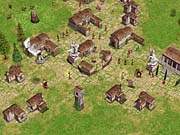
Upon advancing to the various new ages, Poseidon gets new god powers and myth technologies with his chosen minor gods. In the second (classical) age, he can choose to add Hermes, the messenger of the gods, to his pantheon. One of Hermes' myth techs, spirited charge, makes Poseidon's cavalry even deadlier, improving their attack and movement speed. Winged messenger, another myth tech, improves the line of sight, ranged weapon armor, and the cost of the pegasus myth unit, which Poseidon automatically gets in the first age. Hermes' third tech, sylvan lore, is an upgrade to centaurs (which Hermes also provides) that improves their hit points and speed and lowers their cost. His god power is called ceasefire, a defensive power that momentarily prevents any combat from occurring in the game for one minute. Although you can't attack during this time, it is a great way to buy time to make more units or maneuver your troops.
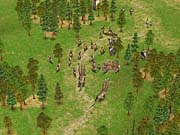
In the third age, Poseidon can choose either Dionysus, the god of wine, or Aphrodite, the goddess of love. "Aphrodite largely benefits villagers and buildings," Street says, "so choosing Dionysus and his cavalry focus is useful for a Poseidon player who wants to have strong cavalry at the expense of his or her economy. Dionysus' big cavalry improvement is Thracian horses (the Thracian horses were man-eating beasts tamed by Heracles, who fed their owner to them). Thracian horses provides a 20 percent boost to cavalry hit points." As if Poseidon needed even better horsemen. Dionysus' other two myth technologies are anastrophe, which makes your ships better in battle, and bacchanalia, which gives all your units slightly higher hit points. The prolific Dionysus also offers two myth units: the famous hydra and the scylla.
Poseidon shares a fourth age minor god in the forge god Hephaestus, but he can also select Artemis. Street explains: "Artemis was the twin sister of Apollo, and the patron of hunting and nature. She was as vengeful as any Greek god, and once turned a man into a stag so that his own hunting dogs would eat him, just for seeing her bathe. Artemis benefits archers, so she is not going to refine Poseidon's already impressive hippikons, but she does come with a great myth unit, the chimera. Artemis has three myth improvements: flames of Typhon, which upgrades chimera (Typhon was the father of the original chimera); shafts of plague, which improves archer attack; and trierarch, which improves Greek triremes, including the Argo." Artemis' impressive god power is earthquake, a deadly power that can destroy Norse cities or severely damage Egyptian ones. This god power is designed primarily to level buildings, so it doesn't do as much damage to units as, say, Hera's lightning storm, but it does do thousands of hit points of harm to structures, and it does do some damage to units as well, including any of your own that happen to be standing in its enormous radius of effect. It is ideal for destroying walls, towers, and fortresses so you can waltz into an enemy town unhindered by base defenses.
More Minor God Benefits: Myth Units
One of the biggest appeals of Age of Mythology is, of course, the battery of cool and interesting mythological units you can command. Four of the five we are looking at here come courtesy of the minor gods mentioned on the previous page. The other myth unit is automatically available as soon as you begin playing as Poseidon. It is the legendary pegasus, which provides yet more recon ability for the Poseidon player. Street says, "With three of the best scouts in the game--the kataskopos as a starting unit, the hippocampus on water, and the pegasus in air--Poseidon is the master of finding resources and seeing what the enemy is up to. The pegasus has no attack, but it is one of the most popular myth units because of its scouting capacity, flying over forests, mountains, and oceans alike. As a flying unit, the pegasus is immune to attack from normal infantry and cavalry. Only archers or buildings with ranged attacks can shoot one down."
Once you choose Hermes as your god, you gain access to the centaur. These human-horse hybrids aren't the most durable or powerful of myth units, but they have a ranged attack and good speed. Its bow makes it ideal for hit-and-run tactics or for staging raids on enemy cultures. This unit is an excellent archer. As for its special ability, Street says, "The cenatur special attack is an accurate shot that takes time to line up, but never misses its target, even if it's moving."
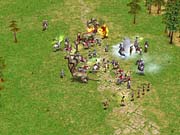
Dionysus' twin mythological units are both multiheaded monsters, even though it might be considered strange that the god of revelry is associated with these monstrous beasts. Hydras are large creatures with seemingly unending hit points and a powerful attack. Street explains: "While the hydra starts with only a few heads, as it fights in battle (almost equivalent to gaining experience), it grows more heads and increases its attack. Each head can even attack a different target. The hydra is powerful against most human soldiers and can knock down buildings as well, though it is expensive and isn't fast."
The other Dionysus unit is scylla, named after the many-headed water monster that attacked the wandering hero Odysseus. Scylla is very good at tearing apart ships, and like the hydra, it grows additional heads as it survives through multiple battles. Unlike other mythological units, the scylla and other naval myth units are built at the docks.
Artemis' mythological unit is the chimera, which is a hybrid of lion, serpent, and goat. Street says, "The Chimera could breathe fire, so the hero Bellerophon had to ride into combat on the original Pegasus to defeat it. Age of Mythology's chimera breathes fire as well, and as such it's able to do damage to a lot of units at once. The chimera doesn't quite have the hit points of the hydra, but has a better attack. Poseidon can make great use of the chimera to stop the advance of hoplites or ulfsarks that are trying to counter your cavalry."
So far, we have revealed lots of information about the Greeks, uncovering many of their units, heroes, technologies, and myth units. The final Greek god, Hades, awaits us. But first, we're traveling back to Egypt, where the god of evil lurks. "What evil dreams and diabolical tricks does Set employ against his foes?" Street asks. "Hint: It involves lions, rhinos, and elephants." Check back with us next month as we continue our Age of Mythology culture countdown.
Got a news tip or want to contact us directly? Email news@gamespot.com
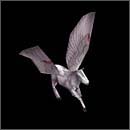
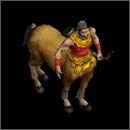
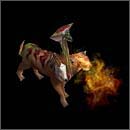
Join the conversation